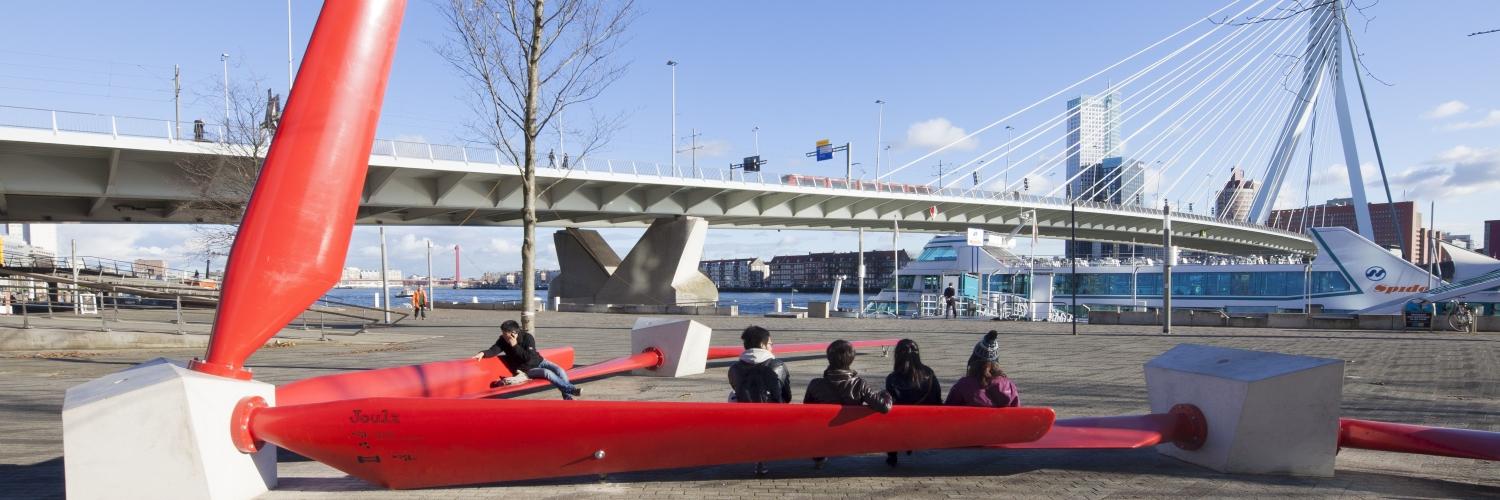
News
4 July 2024
Japanese visit to Dutch recycling hubs
On July 3rd, a delegation from the Japan Industrial Waste Information Center (JW Center) visited the Dutch Waste Management Association (DWMA) to learn about the Dutch approach to recycling and circularity in the construction and demolition waste sector. The Japanese delegation visited recycling companies GP Groot in Alkmaar and REMONDIS in Son en Breugel.
The visit focused on how to extract more recyclable material from construction and demolition waste and the importance of working with the construction sector, which aims to become circular. Japan generates about 80 million tons of construction and demolition waste each year. About 99% of this demolition waste is recycled. Japan is exploring ways to improve its overall recycling performance and make its construction sector more circular.

Motoki Sasaki (Chief Research and Survey Division of JW Information Center), Izumi Sasaki (Staff Research and Survey Division of JW Information Center), Wim Horeman (Director GP Groot Collection and Recycling) during the working visit to GP Groot in Alkmaar. At the recycling location, waste and material flows are processed into new raw materials. This is done, among other things, with 2 recycling installations that together have a processing capacity of 35 tons per hour (photo: Fotopersbureau Dijkstra / Cor Salverius).
Recycling and recovery technologies
Both Japan and the Netherlands have a track record of establishing a modern infrastructure for recycling and recovery technologies while minimizing the landfilling of valuable raw materials. Both countries face water management challenges, are densely populated and have a limited public realm, which requires protection. They therefore need effective regulation and resource management to enable a sustainable economic and living environment. Modern waste management plays a key role in this ongoing mission.
EuRiC Construction and Demolition Branch
Last year the Dutch Waste Management Association (DWMA) cofounded the EuRiC Construction and Demolition Branch to promote recycling and circular construction within the European Union. The construction industry accounts for 10% of the total economic added value in the European Union and provides at least 25 million jobs across 5 million companies. Construction companies are responsible for about 12% of European greenhouse gas emissions and 30% of European waste, equal to 375 million tons of construction and demolition waste each year.
‘Our aim is 90% recycling’
The Dutch and Japanese representatives share the ambition to make the construction sector circular. To achieve this, conditions must be put in place that will enable the conversion of much more construction and demolition waste into recycled materials. To make sure the wider construction market will accept and purchase these. For example recycled aggregates, concrete, fired clay bricks, gypsum, asphalt, inert insulation, plastic foam insulation, rigid plastics and wood. ‘Our aim is to recycle 90% of this waste in Europa. Japan is also on a path towards more recycling. There is growing international interest in creating a circular economy and we want to make this vision as concrete as possible. We have Japan on our side,’ says Unico van Kooten, the DWMA’s European Representative.

Remondis commissioned a new recycling plant which can separate 225,000 tonnes of unsorted construction and demolition waste per year into 22 material streams. A separate wood line processes 125,000 tonnes of demolition and waste wood per year (photo: Fotopersbureau Bert Jansen / Dave Hendriks).
Building Materials Agreement
In anticipation of European developments, the Netherlands is already making the construction sector more circular. All stakeholders in the value chain are working together under the Buildings Materials Agreement, of which the DWMA is a signatory.
Sustainable construction and building materials are crucial to achieving a fully circular construction economy and meeting the Dutch targets for reducing carbon emissions (55% by 2030), lowering primary raw materials use, minimizing waste and reducing dependency on other countries. The Ministry of the Interior, in consultation with parties in the construction industry, has concluded that the current rate of sustainability adoption in construction supply chains is insufficient to achieve these goals. Better cooperation between parties is therefore needed to accelerate progress towards a sustainable construction and building materials industry.
Transition to a circular economy
‘We fully support our shared ambitions, including the Building Materials Agreement,’ says Roger Versluis, Chairman of the DWMA’s Construction and Demolition Working Group and Regional Director South of REMONDIS Netherlands. ‘We see this as the next step towards our common goal of accelerating the transition to a circular economy. We are convinced that this step will make an important contribution to closing recycling loops and optimizing sustainable processes.'
Circular construction will ensure efficient use of the available raw materials in Europe while at the same time reducing carbon emissions and the environmental impact of materials use. ‘As a sector we are exploring national and European policies that support a real transition towards a circular construction sector. One key element is securing market demand for our recycled materials. This will have a systemic constructive impact on the entire waste management sector and drive recycling forward. In addition, a mandatory EU standard for minimal recycled content in new construction products will lead to a more mature market,’ says Wim Horeman, Director of GP Groot Collection and Recycling.
Survey of European countries
This year, JW Center will be conducting a survey of European countries that have developed policies and advanced approaches to waste recycling. Given the large amount of construction and demolition waste in Japan, the JW Centre asked the DWMA to cooperate in a study of European initiatives for recycling construction and demolition waste

